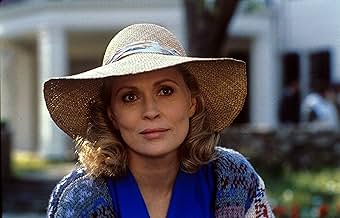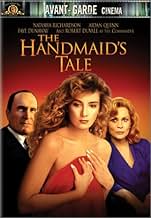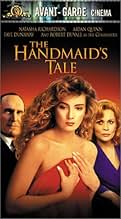अपनी भाषा में प्लॉट जोड़ेंUnder a dystopian religious tyranny, most women cannot conceive children. Those young women who can live in a form of sexual slavery to provide children for influential families.Under a dystopian religious tyranny, most women cannot conceive children. Those young women who can live in a form of sexual slavery to provide children for influential families.Under a dystopian religious tyranny, most women cannot conceive children. Those young women who can live in a form of sexual slavery to provide children for influential families.
- निर्देशक
- लेखक
- स्टार
- पुरस्कार
- 2 जीत और कुल 1 नामांकन
Reiner Schöne
- Luke
- (as Rainer Schoene)
Robert D. Raiford
- Dick
- (as Robert Raiford)
फ़ीचर्ड समीक्षाएं
An unfortunate movie which is definitely more like Harold Pinter's earlier plays than anything Margaret Atwood ever produced. No attempt is made to bring out Atwood's clever social message, and we're all supposed to be shocked at the sexual content. A shame, because Atwood's version might have made a good film.
There's nothing subtle about this screen adaptation of Margaret Atwood's cautionary fable, but the premise is nothing if not provocative: in a repressive fundamentalist dictatorship (called Gilead, but ostensibly America in the near future) the few remaining fertile women are forced to bear children, in effect becoming sexual servants to the (male) powers-that-be. Gilead may be colored red, white and blue, but there's more than a passing resemblance to Orwell's Oceana; even the act of conception is reduced to a ritual, with the euphemism 'ceremony' doubling for intercourse. A talented cast does its best with Harold Pinter's typically inscrutable screenplay, but under Volker Schlondorff's dispassionate direction the film never achieves a convincing level of oppression or paranoia. Worse, it lacks a story to match its scenario; the handmaid Offred's redemption is achieved only with the help of another man, which seems to deflate the feminist slant. The final result is nowhere near a successful movie, but never less than a fascinating failure.
Margaret Atwood, a Canadian novelist (and poet) wrote the dark fantasy novel on which this film is based. It is set in The Republic of Gilead, formerly the United States, or at least the parts of it that are not radioactive. The radioactive parts are called the colonies, where bad girls are sent to die of radiation poisoning. The time is the near future, after the inevitable nuclear war, and the breakdown of government as we know it.
The society depicted in The Handmaid's Tale is a nightmare: everyone is watched by the Eyes, unknowable, unseen government spies. Women are forbidden to have jobs. They are irrevocably assigned to classes. At the top are the chaste, but morally superior, Wives, almost all of whom have been rendered infertile by the inevitable unclear war. At the bottom are the housekeepers, or Marthas, who are non-entities. In the middle are the Handmaids of the title, who are fertile, but tightly controlled. The term Handmaid is a Biblical term that is used in the Old Testament stories of Abraham, Sarah, Jacob and Rachel. In the Bible, the wives gave their handmaids to their husbands in order to produce heirs.
Handmaids, in the film and the book, are forced to have sex with the Commanders, the husbands of the Wives. During this sex, the Wives are intimately present to take in any "love" their Commanders have to give.
The Handmaids are trained to remain unattached to the Commanders. They are prohibited from using makeup or doing anything to make themselves attractive. Handmaids are forced to turn their offspring over to the morally "fit" Wives.
Robert Duvall, a Commander in whose home Offred is placed, gives a family Bible reading performance that will curdle the blood of true people of faith. It is a breathtaking, heart-stopping performance.
The government is totalitarian and monotheistic. The one god is very strict, and has His Eyes everywhere.
Offred, who was once known as Kate, is a Handmaid who, despite her training (read brainwashing), recalls her past, her loving husband, and her adored daughter. She tells with sparkling, and terrifying clarity, how the society came to be the way it is.
This governmental aspect of the story is instructive, however, they are almost totally absent in the film.
Offred's/Kate's personal story is heartrending. It reminds one of the miseries of, say, the women of Darfur. When the government breaks down, she and her husband and daughter attempt to flee to Canada. Unfortunately, they are caught. Her daughter is "confiscated." Her husband is taken away. She never sees her husband again.
Offred's training is not as extensively portrayed in the film as it is in the book, but her feeling of terror and helplessness are palpable, in an exquisite performance by Natasha Richardson. Warning, blood is shown.
As we ride down the slippery slope toward the overturning of Roe v. Wade, this film is a must see for those who still care about women's rights.
The society depicted in The Handmaid's Tale is a nightmare: everyone is watched by the Eyes, unknowable, unseen government spies. Women are forbidden to have jobs. They are irrevocably assigned to classes. At the top are the chaste, but morally superior, Wives, almost all of whom have been rendered infertile by the inevitable unclear war. At the bottom are the housekeepers, or Marthas, who are non-entities. In the middle are the Handmaids of the title, who are fertile, but tightly controlled. The term Handmaid is a Biblical term that is used in the Old Testament stories of Abraham, Sarah, Jacob and Rachel. In the Bible, the wives gave their handmaids to their husbands in order to produce heirs.
Handmaids, in the film and the book, are forced to have sex with the Commanders, the husbands of the Wives. During this sex, the Wives are intimately present to take in any "love" their Commanders have to give.
The Handmaids are trained to remain unattached to the Commanders. They are prohibited from using makeup or doing anything to make themselves attractive. Handmaids are forced to turn their offspring over to the morally "fit" Wives.
Robert Duvall, a Commander in whose home Offred is placed, gives a family Bible reading performance that will curdle the blood of true people of faith. It is a breathtaking, heart-stopping performance.
The government is totalitarian and monotheistic. The one god is very strict, and has His Eyes everywhere.
Offred, who was once known as Kate, is a Handmaid who, despite her training (read brainwashing), recalls her past, her loving husband, and her adored daughter. She tells with sparkling, and terrifying clarity, how the society came to be the way it is.
This governmental aspect of the story is instructive, however, they are almost totally absent in the film.
Offred's/Kate's personal story is heartrending. It reminds one of the miseries of, say, the women of Darfur. When the government breaks down, she and her husband and daughter attempt to flee to Canada. Unfortunately, they are caught. Her daughter is "confiscated." Her husband is taken away. She never sees her husband again.
Offred's training is not as extensively portrayed in the film as it is in the book, but her feeling of terror and helplessness are palpable, in an exquisite performance by Natasha Richardson. Warning, blood is shown.
As we ride down the slippery slope toward the overturning of Roe v. Wade, this film is a must see for those who still care about women's rights.
The handmaids in brilliant red, the wives in electric blue, the children in white--Margaret Atwood's neo-fascist state comes startingly alive in Schloendorff's film. The bright colors are oppressive in their uniformity, whether in the "ceremony"--Robert Duvall's passionless copulation with Natasha Richardson as she lies in the lap of his sterile wife, Faye Dunaway--or in the party to celebrate the birth of a handmaid's child, or the execution of another handmaid for fornication. There are several fine actors--Elizabeth McGovern and Aidan Quinn also play memorable, if brief, roles--but the cinematography steals the show here, giving this anti-Utopia the same oppressive tension as the original 1984 and far surpassing any version of Brave New World. It may be that Atwood's book, which I haven't read, adds layers of depth to the characters and plot, but Schloendorff's visualisation is a real enhancement to the tale. He creates the tension of a police state with only momentary intrusions of brutality or machinery. A strong film that will gain its following with time.
This movie is about what can happen when religious nuts take over the country's government. People who are different are either killed or enslaved in one way or another. Let's see...we have murder and public display of anyone who isn't of the religion that took over....women who are fertile enslaved for religious higher-up's in the government...anyone who's different, and ISN'T killed enslaved in radioactive areas...makes you realize why people fight so hard against religion intruding into politics. Like the scholars from the future of this story who have a hard time believing it actually happened, despite hearing the story with their own ears, people nowadays don't believe that "people of God" in government would be so bad. Watch this movie and think on it. This is why there's a separation of church and state.
क्या आपको पता है
- ट्रिवियाWhile working on the film, Robert Duvall became so fascinated with evangelism that it inspired him to write The Apostle (1997).
- गूफ़When Moira ties up Aunt Lydia and escapes the Red Center, it is late at night, but moments later, when she exits, it is clearly daytime.
- साउंडट्रैकWhispering Hope
Written by Septimus Winner as Alice Hawthorne
टॉप पसंद
रेटिंग देने के लिए साइन-इन करें और वैयक्तिकृत सुझावों के लिए वॉचलिस्ट करें
- How long is The Handmaid's Tale?Alexa द्वारा संचालित
विवरण
- रिलीज़ की तारीख़
- कंट्री ऑफ़ ओरिजिन
- आधिकारिक साइट
- भाषा
- इस रूप में भी जाना जाता है
- El cuento de la doncella
- फ़िल्माने की जगहें
- James Adams Buchanan House, 1810 Cedar St, डरहम, उत्तरी कैरोलिना, संयुक्त राज्य अमेरिका(Commander Fred's house)
- उत्पादन कंपनियां
- IMDbPro पर और कंपनी क्रेडिट देखें
बॉक्स ऑफ़िस
- US और कनाडा में सकल
- $49,60,385
- US और कनाडा में पहले सप्ताह में कुल कमाई
- $7,38,578
- 11 मार्च 1990
- दुनिया भर में सकल
- $49,60,385
- चलने की अवधि1 घंटा 49 मिनट
- रंग
- ध्वनि मिश्रण
- पक्ष अनुपात
- 1.85 : 1
इस पेज में योगदान दें
किसी बदलाव का सुझाव दें या अनुपलब्ध कॉन्टेंट जोड़ें




































